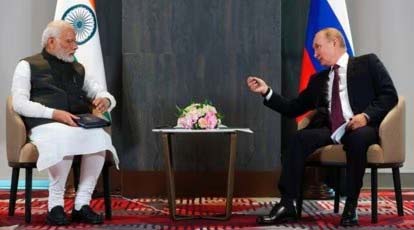India’s distinctive stance on the conflict in Ukraine and its balanced approach thus far may position it as a pivotal intermediary. This was evidenced by Ukrainian President Zelensky’s expressed interest in New Delhi’s participation in the upcoming inaugural peace summit to be convened in Switzerland in the imminent months.
Recent telephonic dialogues between Prime Minister Narendra Modi and both Russian President Vladimir Putin and Ukrainian President Volodymyr Zelensky have sparked conjecture regarding India’s potential role in mediating and fostering a peaceful resolution to the ongoing Russia-Ukraine hostilities.
ETV Bharat interviewed Harsh V Pant, Vice-President for Studies at the Observer Research Foundation, New Delhi, to glean insights into the significance of the summit and India’s role amidst the conflict. He remarked, “The forthcoming peace summit in Switzerland holds considerable importance as there is a palpable impetus towards peace at present. There exists a weariness of war—Ukraine confronts dwindling support from Western capitals, while Russia grapples with significant strain owing to the conflict.”
Pant suggested that the summit might yield progress, albeit uncertainties persist regarding Russia’s potential attendance.
“The inaugural peace summit marks a seminal step towards negotiating a resolution to this conflict. Recognizing India as a pivotal mediator today underscores the summit’s credibility, rendering New Delhi’s participation indispensable,” Pant asserted.
“India, maintaining open lines of communication with both sides, exemplifies its significance as an intermediary. The ability to engage with both the Russian and Ukrainian Presidents on the same day underscores India’s pivotal role in conflict resolution,” he conveyed to ETV Bharat.
India has consistently advocated for negotiation and diplomacy as the preferred paths forward. Prime Minister Modi’s public assertion to President Putin that the current epoch is not one of warfare enhances his credibility, affording him maneuvering space not readily available to other global leaders, Pant noted.
Meanwhile, Ukraine’s Foreign Minister Dmytro Kuleba is anticipated to undertake his inaugural visit to India since the onset of the Russian incursion in 2022, likely by the end of this month, possibly by March 27, to garner support for the peace summit. His visit is yet to be formally announced.
According to sources, Kuleba, accompanied by a high-level delegation, is slated to co-chair a session of the India-Ukraine inter-governmental commission with his Indian counterpart S Jaishankar.
This session will mark the commission’s first convening since 2018 and will prioritize discussions on the impending peace summit aimed at resolving the Russia-Ukraine conflict, to be hosted by neutral Switzerland.
While refraining from publicly censuring Russia over the invasion of Ukraine, India has reiterated its backing for all initiatives aimed at achieving a peaceful resolution through dialogue and diplomacy.
During a meeting with Russian President Vladimir Putin in September 2022, Prime Minister Narendra Modi articulated, “Today’s epoch does not favor war.”
In 2023, Ukraine dispatched Deputy Foreign Minister Emine Dzhaparova to India, followed by Deputy Foreign Minister Iryna Borovets’ visit in February.




